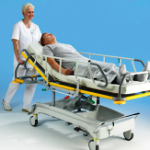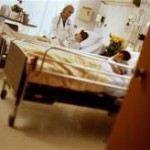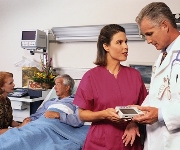 The role of the nurse in disease prevention
The role of the nurse in disease prevention

The role of a nurse in the prevention of diseases of a very different nature in a wide variety of branches of medicine is great and significant The nurse is near the patient most of her working time and much longer than the doctor. And it has the right and obligation to convey knowledge about the prevention of diseases of various organs and systems, as well as infectious diseases.
The role of the nurse in the prevention of nosocomial infections
The greatest importance is attached to the role of mid-level health workers in the prevention of nosocomial infections (nosocomial infections) or HAIs (health care-associated infections). At the same time, the main part of preventive measures is related to the observance of the sanitary and epidemiological regime. Responsibility lies with both the executors and the persons carrying out the organization and control. In other words, for ward nurses, procedural, operating room nurses, anesthetists, physiotherapists and others, and for the head nurses of the department, as well as epidemiologist assistants who control the organization and implementation of the SEP in the department.
The better the work is organized in terms of the implementation of sanitary rules, the more clearly all requirements are met, the more often and better production control is carried out, the lower the risk of HCAI.
The role of the district nurse in disease prevention
The most important part of the work of the district nurse is sanitary-educational and explanatory work among patients entrusted to her along with the doctor of the site. The duties of the district nurse include assessing the hygienic condition of patients observed at home, teaching them and their relatives proper care and self-care.
It is important that a patient with a chronic illness knows how to behave in case of symptoms, has certain skills (for example, to measure blood pressure), and, if necessary, calls for medical help in time. The nurse should patiently explain to the patient how important it is to maintain a healthy lifestyle, if prescribed by a doctor - to take certain drugs. At the same time, emphasize that this is the only way to avoid exacerbation of the disease or any complications.
The role of the visiting nurse in disease prevention
Patronage is a form of work of the district service, the purpose of which is to carry out recreational and preventive measures. That is, the role of paramedical workers in the prevention of diseases is the main, most important. Patronage nurses, like doctors, observe their wards in children's clinics, midwives and obstetrician-gynecologists in antenatal clinics, paramedics and nurses - at feldsher-obstetric stations.
Pregnant women, newborn children with mothers-puerperas, children under the age of 1 year are patronized. The nurse (paramedic, midwife) explains the rules for preparing for childbirth and meeting the newborn at home (what you need to buy, what conditions to observe in the apartment). A pregnant woman is explained some of the basics of legislation on the protection of the rights and health of women. A pregnant woman is scheduled to attend a antenatal clinic (at a FAP). In case of a pregnant woman's absence, the midwife visits her at home, finds out the reason, and if there is a pathology, sends her to the hospital.
The patronage nurse of the children's polyclinic visits the pregnant woman at home from 38 weeks, finding out the living conditions, the state of health of the pregnant woman. The first 3 days after discharge from the maternity hospital, the mother with the newborn is visited by a doctor and a nurse. At the same time, advice is given on feeding, bathing, sleeping and walking.
The role of a nurse in a preschool and school institution in disease prevention
A huge responsibility for the health of children falls on the shoulders of medical workers in kindergartens and schools. Therefore, here the work of a nurse should be hyper-responsible. Preventive measures are practically the entire activity of a nurse.
The main duties of a nurse in a children's educational institution:
- control of the sanitary and hygienic condition of the premises, including the catering department;
- nutrition control, participation in the preparation of the menu;
- distribution of children to physical culture groups;
- immunoprophylaxis - preparation, conduct, evaluation of vaccination;
- clinical examination of children with chronic diseases;
- conducting preventive medical examinations;
- identification of sick, infected children, their isolation, informing parents, if necessary - transportation to a medical institution;
- analysis of the health status of children according to specified criteria.
The role of the ward nurse in disease prevention
The work of a nurse in the department is not limited to procedures, manipulations and filling out documentation. One of the most important duties of a nurse is to conduct health education and explanatory work among patients who are being treated in a hospital.
According to the profile of the department, the nurse has a professional qualification. Therefore, in a language accessible to the patient, all methods of preventing the occurrence of acute diseases and chronic exacerbations should be promoted. These are conversations directly with patients within their competence and non-disclosure of medical secrets, in compliance with ethics and deontology, and advice to relatives, and the issuance of health bulletins, information leaflets.
Thus, we have seen that the role of the nurse in disease prevention is enormous in any field of health care for patients of absolutely all ages. The nurse should always remember and repeat to patients that
disease is easier to prevent than to cure.





